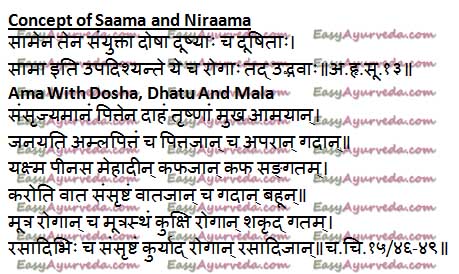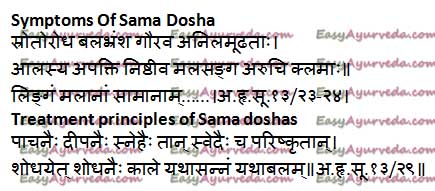Association Of Ama With Doshas, Tissues And Waste Products
Article by Dr Raghuram Y.S. MD (Ay) & Dr Manasa, B.A.M.S
Ama is the product of improper digestion. It is a substance formed in the stomach in the form of immature essence of digestion. When this remains in the gastro intestinal for long duration, it undergoes fermentation and decay. This fermented undigested food is called ama. It acquires form of poison over a period of time and imparts poison like dreadful effect over the body.
Related Reading – Ama, definition, meaning
Table of Contents
Concept of Saama and Nirama
The toxins formed as a resultant of improper digestion gets associated with body elements over a period of time.

Saama
When any element of the body is associated with ama, it will be called saama. Saama = sa + ama i.e. with association of ama.
- Saama Doshas – Doshas associated with ama, are called as Saama Doshas.
Example – Saama Vata, Saama Pitta, Saama Kapha etc - Saama Dhatus – Tissues associated with ama, are called as Saama Dhatus.
Example – Saama Rasa, Saama Rakta, Saama Mamsa etc - Saama Malas – Excreta of the body associated with ama, are called as Saama Malas.
Example – Saama Pureesha, Saama Mutra, Saama Sweda etc
Dushyas is the name given to tissues and excreta collectively. Thus the tissues and metabolic wastes associated with ama are collectively called as saama dushyas.
Niraama
When any element of the body is not associated with ama, it will be called niraama. Niraama = nir + ama i.e. without the association of ama.
Niraama Doshas – Doshas dissociated from ama, they are called as Niraama Doshas.
Example – Niraama Vata, Niraama Pitta, Niraama Kapha etc
Niraama Dhatus – Tissues dissociated from ama, are called as Niraama Dhatus.
Example – Niraama Rasa, Niraama Rakta, Niraama Mamsa etc
Niraama Malas – Excreta dissociated from ama, are called as Niraama Malas.
Example – Niraama Pureesha, Niraama Mutra, Niraama Sweda etc
The tissues and metabolic wastes dissociated from ama are collectively called as niraama dushyas.
Associations of Anna Visha
Association of anna visha with doshas, dhatus and malas
Anna visha or toxins derived from improper digestion of food is synonymous with ama. Therefore in this context it is apt to discuss about the association of food derived toxins with doshas, tissues and excreta since they too are forms of saama doshas, tissues and excreta.
With Pitta
When it gets associated with pitta, it causes –
- Daha – burning sensation
- Trishna – severe thirst
- Mukha amaya – diseases of oral cavity
- Amlapitta – gastritis
- Apara pittaja gada – other pittaja disorders
With Kapha
When it gets associated with kapha, it causes –
- Yakshma – tuberculosis
- Peenasa – cold, rhinitis
- Meha – urinary disorders, diabetes
- Kaphaja rogas – other diseases caused due to high kapha
With Vata
When it gets associated with vata, it causes vata disorders.
With Mala
When associated with urine, it causes urinary disorders.
When associated with feces, it causes abdominal and pelvic disorders.
With Dhatu
When associated with the tissues, it causes diseases pertaining to the tissues.
Saama Dosha Lakshana

Saama Dosha Lakshanas – Symptoms caused by doshas associated with ama
Srotorodha – means obstruction in the channels, ducts or transport system of the body. The essential nutrients and materials needed for formation and maintenance of all the tissues of the body are carried from one place of the body to the other by srotas.
Ama sticks to the walls of the channels owing to its sticky nature and causes blocks in them. The channels thus blocked fail to supply the nutrients to the place of requirement. This leads to inadequate tissue formation, tissue damage, lack of support to the body, manifestation of diseases and loss of immunity.
Read related: Qualities And Symptoms Of Ama – Ama Guna Lakshana
Mala sanga – means obstruction in expulsion of metabolic wastes i.e. feces, urine and sweat. This happens due to obstruction of channels and passages of the body due to ama sticking within their walls.
Bala Bhramsha – means loss of strength. This happens due to block of channels and deprivation of nutrients to the tissues.
Klama – means tiredness. This happens due to loss of strength resulting from the block of channels by ama.
Gourava – means heaviness. Since ama is undigested food, it is heavy in nature. Since it is not metabolized even in the tissues, it gets stagnated and causes heaviness in the entire body.
Alasya – means lethargy. This is a resultant of heaviness of the body which happens due to the stagnation of ama in the body tissues. As a result all the physical and mental activities will slow down.
Anila Mudhata – means arrest of movements of vata. Vata circulates and moves all through the body, in all channels. It is responsible for free movements of all the elements in the body as it is the driving force of all activities. Since ama cause blocks in the channels of the body, the vayu cannot move freely. As a result it tends to move haphazardly and cause serious troubles.
Apakti – means indigestion. Formation of ama further deteriorates the gut fire and tissue fire. This leads to further worsening of indigestion. Indigestion causes ama and ama worsens indigestion, this cyclic process worsens the morbidity in the body with depletion of nutrition and formation of diseases.
Aruchi – means tastelessness. This happens due to indigestion and weakening of fire.
Nishteeva – means excess formation of contaminated phlegm and also its elimination through mouth. There is a severe urge to spit, frequently. Ama has all qualities of kapha. When the quantity of ama increases in the body, kapha also increases. This increased kapha tends to get expelled from mouth frequently.
Nirama Dosha Lakshanas
Nirama Dosha Lakshanas – Symptoms caused by doshas dissociated from ama
Signs and symptoms of niraama dosha will be opposite to those of saama doshas.
Sroto anavarodha – absence of blocks of channels of the body
Bala abhramsha – no loss of strength
Laghuta – feeling of lightness of the body
Anila sanchara – free movement of vata all through the body
Spurthi – alertness, enthusiasm
Ahara pachana – balanced digestion of food
Mala pravritti – free and effortless expulsion of metabolic wastes
Ruchi – feeling of taste in food
Klama rahitatva – absence of tiredness
Saama Dosha treatment
Treatment principles of Sama Doshas
Pachana – ama liquefying or destroying medicines
Deepana – medicines to enhance the digestive fire
Sneha – administration of medicated ghee for oral intake
Swedana – sweat inducing therapies
Shodhana – cleansing treatments in the form of therapeutic emesis and therapeutic purgation should be administered according to the strength of the patient
Saama and Niraama Rogas
Saama Rogas
The diseases caused by saama doshas, tissues or metabolic wastes are called as Saama Rogas. Example, ama jwara, amatisara etc
The symptoms of diseases associated with ama –
- Alasya – lethargy
- Tandra – drowsiness
- Aruchi – anorexia
- Mukha vairasya – manifestation of abnormal tastes in the mouth
- Arati – restlessness
- Gaurava – heaviness of the body
- Klama – tiredness
- Agnimandhya – weakness of digestive fire
The symptoms of relieve from ama
- Laghutva – feeling of lightness in the body
- Indriya prasannata – feeling of pleasantness in the mind and senses
- Ruchi – taste in food
- Vata anulomana – free and effortless expulsion of vayu flatus
Need of knowledge of Saama and Niraama body elements
The physician should have a precise knowledge of saama and niraama body elements as it forms a backdrop for proper administration of treatments. The diseases may or may not be associated with ama. In both cases the line of treatment would be different. When the diseases are associated with ama, the physician needs to administer ama dissolving medicines before flushing the morbid doshas out of the body through cleansing therapy.
If the doshas are expelled without administering ama digestive medicine, then it causes severe life threatening complications.
Click to Consult Dr Raghuram Y.S. MD (Ayu) – Email / Skype










